Francesca Dellera | |
|---|---|
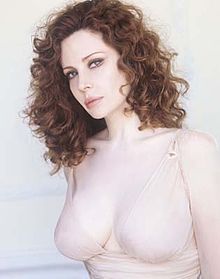 | |
| Born | 2 October 1965 Latina, Lazio, Italy |
| Occupations |
|
Francesca Dellera (born 2 October 1965) is an Italian actress and model.
Francesca Dellera | |
|---|---|
 | |
| Born | 2 October 1965 Latina, Lazio, Italy |
| Occupations |
|
Francesca Dellera (born 2 October 1965) is an Italian actress and model.
Dellera was born in a Jewish family in Italy. After her high school degree in classical studies, Francesca Dellera started working as a model. She was shot by world-class photographers such as Helmut Newton, Dominique Issermann, Greg Gorman, Michel Comte as well as others. The fashion journalist Natalia Aspesi described Francesca Dellera in the following way: "When compared to the unsexy parameters that are part of the current times, Francesca Dellera is a young woman from a different era, her soft white skin is something one does not see anymore. Today, femininity is something flashy and without sex appeal as often portrayed in television or even in fashion". [1]
Dellera was launched by film director Tinto Brass, who chose her as main actress in the erotic movie Capriccio (1987); the film was a great success making her one of the most popular actresses in Italy at the time. [2]
The following year she shot the TV miniseries La romana, directed by Giuseppe Patroni Griffi and opposite Gina Lollobrigida. [2] [3]
La Romana was the television version of the film bearing the same name directed by Luigi Zampa. The film itself was based on the novel by Alberto Moravia, and in the television series, an audience of over 10 million watched Dellera in her lead role with Gina Lollobrigida (leading actress in the original film). For her performance Dellera won the Telegatto award.
With the 1991 film The Flesh directed by Marco Ferreri Dellera reached international acclaim. The film entered the 1991 Cannes Film Festival and the actress suddenly gained much popularity in France; Ferreri described Dellera as having "the most beautiful skin in Italian cinema". One of the most important Italian film critics Tullio Kezich said about Dellera in The Flesh: "Her physical allure speaks for itself. As an actress, she has something exceptionally special. She is so comfortable in front of the movie camera that when she is dressed, she seems nude, and when she is nude, she seems dressed". [4]
Federico Fellini chose her for the role of the fairy for a film based on Collodi's Pinocchio , opposite Roberto Benigni in the main role, but the film was never made due to the director's sudden death. [5]
Later she moved to Paris, where she had an affair with Christopher Lambert [2] [6] and she was also a catwalk model for Jean Paul Gaultier. The singer Prince flew to Paris to meet with her and rented out an entire theatre to watch her movie "The Flesh" by himself. He proposed for her to appear in one of the videos to his songs, too. Although she had to turn down the offer due to other professional commitments. [7] [8]
In 1994 she starred in Jacques Deray's L'Ours en peluche , alongside Alain Delon, her last film; after that, she only shot TV-series. [2]
After some years she returned in Italy where in 1999 she played the title role in Nanà, a television mini-series directed by Alberto Negrin, based on the eponymous novel by Émile Zola. After a lack of some year, in 2006 she returned in the TV film La contessa di Castiglione, an Italian-French co-production directed by Josée Dayan, alongside Jeanne Moreau; this is her last appearance on screen.
She also appeared in several advertising campaigns.
| Year | Title | Role | Notes |
|---|---|---|---|
| 1986 | Grandi magazzini | Girl in red | Cameo appearance |
| 1987 | Capriccio | Rosalba Moniconi | |
| 1987 | Roba da ricchi | Princess Topazia | Segment: "Terzo episodio" |
| 1991 | The Flesh | Francesca | |
| 1994 | The Teddy Bear | Chantal |
| Year | Title | Role | Notes |
|---|---|---|---|
| 1988 | La romana | Adriana | Miniseries |
| 1989 | La bugiarda | Isabella | Television film |
| 2001 | Nanà | Nanà | Miniseries |
| 2006 | La contessa di Castiglione | Virginia Oldoini, Countess of Castiglione | Television film |

Federico Fellini was an Italian film director and screenwriter. He is known for his distinctive style, which blends fantasy and baroque images with earthiness. He is recognized as one of the greatest and most influential filmmakers of all time. His films have ranked highly in critical polls such as that of Cahiers du Cinéma and Sight & Sound, which lists his 1963 film 8+1⁄2 as the 10th-greatest film.

Luigia "Gina" LollobrigidaOMRI was an Italian actress, model, and photojournalist. She was one of the highest-profile European actresses of the 1950s and 1960s, a period in which she was an international sex symbol. Dubbed "the most beautiful woman in the world", at the time of her death she was among the last surviving high-profile international actors from the Golden Age of Hollywood cinema.
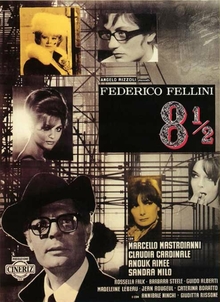
8+1⁄2 is a 1963 Italian surrealist psychological comedy-drama film directed and co-written by Federico Fellini. The metafictional narrative centers on Guido Anselmi,, a famous Italian film director who suffers from stifled creativity as he attempts to direct an epic science fiction film. Claudia Cardinale, Anouk Aimée, Sandra Milo, Rossella Falk, Barbara Steele, and Eddra Gale portray the various women in Guido's life. The film is shot in black and white by cinematographer Gianni Di Venanzo and features a score by Nino Rota, with costume and set designs by Piero Gherardi.
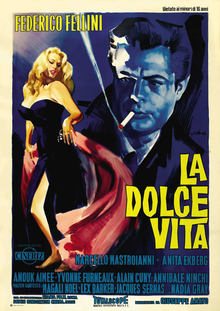
La dolce vita is a 1960 satirical comedy-drama film directed and co-written by Federico Fellini. The film stars Marcello Mastroianni as Marcello Rubini, a tabloid journalist who, over seven days and nights, journeys through the "sweet life" of Rome in a fruitless search for love and happiness. The screenplay, written by Fellini and three other screenwriters, can be divided into a prologue, seven major episodes interrupted by an intermezzo, and an epilogue, according to the most common interpretation.

Nights of Cabiria is a 1957 drama film co-written and directed by Federico Fellini. It stars Giulietta Masina as Cabiria, a prostitute living in Rome. The cast also features François Périer and Amedeo Nazzari. The film is based on a story by Fellini, who expanded it into a screenplay along with his co-writers Ennio Flaiano, Tullio Pinelli and Pier Paolo Pasolini.

Giulia Anna "Giulietta" Masina was an Italian film actress best known for her performances as Gelsomina in La Strada (1954) and Cabiria in Nights of Cabiria (1957), for which she won the Cannes Film Festival Award for Best Actress at the 1957 Cannes Film Festival.
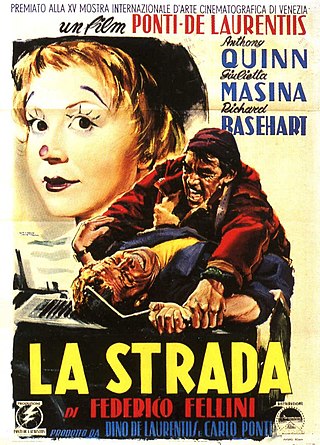
La strada is a 1954 Italian drama film directed by Federico Fellini and co-written by Fellini, Tullio Pinelli and Ennio Flaiano. The film tells the story of Gelsomina, a simple-minded young woman bought from her mother by Zampanò, a brutish strongman who takes her with him on the road.

I vitelloni is a 1953 Italian comedy drama film directed by Federico Fellini from a screenplay written by himself, Ennio Flaiano and Tullio Pinelli. It stars Franco Interlenghi, Alberto Sordi, Franco Fabrizi, Leopoldo Trieste, and Riccardo Fellini as five young Italian men at crucial turning points in their small town lives. Recognized as a pivotal work in the director's artistic evolution, the film has distinct autobiographical elements that mirror important societal changes in 1950s Italy.
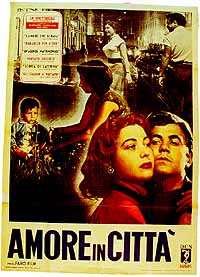
Love in the City is a 1953 Italian anthology film composed of six segments, each with its own director. The segments and filmmakers are: Paid Love, Attempted Suicide, Paradise for Three Hours, Marriage Agency, Story of Caterina, and Italians Stare.
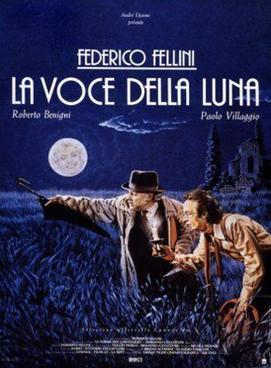
The Voice of the Moon is a 1990 Italian fantasy comedy film directed and written by Federico Fellini and starring Roberto Benigni, Paolo Villaggio, and Nadia Ottaviani. Based on the novel Il poema dei lunatici by Ermano Cavazzoni, and revisiting themes Fellini first explored in La strada (1954), the film is about a fake inspector of wells and a former prefect who wander through the Emilia-Romagna countryside of Fellini's childhood and discover a dystopia of television commercials, fascism, beauty pageants, rock music, Catholicism, and pagan ritual.
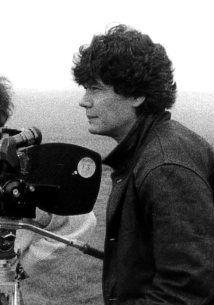
DamianPettigrew (1963) is a Canadian filmmaker, screenwriter, producer, author, and multimedia artist, best known for his cinematic portraits of Balthus, Federico Fellini, and Jean Giraud.

Tullio Kezich was an Italian screenwriter and playwright, best known as the film critic for Corriere della Sera and for his award-winning biography of Italian director Federico Fellini.

Tullio Pinelli was an Italian screenwriter known for his work on the Federico Fellini films I Vitelloni, La Strada, La Dolce Vita and 8½.
I'm a Born Liar: A Fellini Lexicon is a book combining film stills and photographs with transcripts of the last filmed interviews with Federico Fellini conducted by Canadian filmmaker Damian Pettigrew in Rome in 1991 and 1992. The interviews are edited and introduced by Pettigrew with a preface by Italian film critic and Fellini biographer Tullio Kezich.

Alarm Bells is a 1949 Italian drama film directed by Luigi Zampa and starring Gina Lollobrigida, Yvonne Sanson and Eduardo De Filippo.
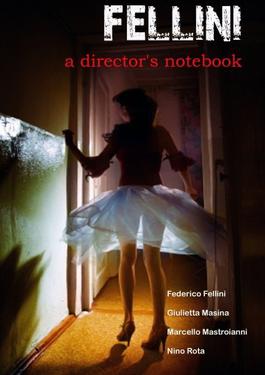
Fellini: A Director's Notebook is an Italian documentary for television directed by Federico Fellini shot in 16mm and first broadcast in the United States on NBC in 1969, on NBC Experiment in Television.
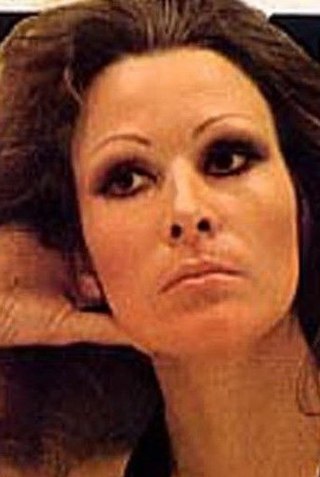
Greta Vaillant was a French actress and author. She was sometimes credited as Greta Vayan and Gretta Vaillont.
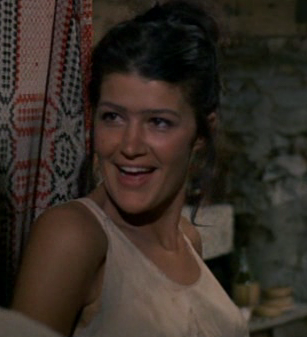
Francesca Romana Coluzzi was an Italian actress. A respected dramatic actress on stage, she is probably best known for her roles in the commedia sexy all'italiana.

Dina Galli was an Italian actress known for her comic stage roles. Galli also appeared in fourteen films during her career.
Maria Maddalena Fellini was an Italian actress and writer. She was also well known for being the sister of Federico Fellini. Her other brother was the actor and television director Riccardo Fellini.